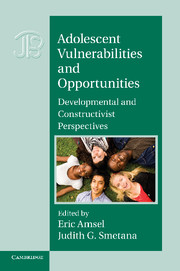Book contents
- Frontmatter
- Contents
- Figures and Tables
- Series Editor’s Preface
- Preface
- 1 Constructivist Processes in Adolescent Development
- Part I Biological And Cognitive Perspective
- 2 Structural Brain Magnetic Resonance Imaging of Typically Developing Children and Adolescents
- 3 Adolescent Risk Taking: A Social Neuroscience Perspective
- 4 What Are the Cognitive Skills Adolescents Need for Life in the Twenty-First Century?
- 5 Hypothetical Thinking in Adolescence: Its Nature, Development, and Applications
- PART II Social and Contextual Perspective
- Index
- References
5 - Hypothetical Thinking in Adolescence: Its Nature, Development, and Applications
from Part I - Biological And Cognitive Perspective
Published online by Cambridge University Press: 07 October 2011
- Frontmatter
- Contents
- Figures and Tables
- Series Editor’s Preface
- Preface
- 1 Constructivist Processes in Adolescent Development
- Part I Biological And Cognitive Perspective
- 2 Structural Brain Magnetic Resonance Imaging of Typically Developing Children and Adolescents
- 3 Adolescent Risk Taking: A Social Neuroscience Perspective
- 4 What Are the Cognitive Skills Adolescents Need for Life in the Twenty-First Century?
- 5 Hypothetical Thinking in Adolescence: Its Nature, Development, and Applications
- PART II Social and Contextual Perspective
- Index
- References
Summary
It is the mark of an intelligent mind to be able to
entertain an idea without necessarily accepting it.
– Aristotle
Classic theories of human development characterize adolescence as a period of an awakening of new, powerful, and pervasive abilities and talents. Such was the claim of G. Stanley Hall (1904, cited in Grinder 1969, p. 358) who noted that “adolescence is ... the only point of departure for the superanthropoid that man is to become.” Similarly, Piaget (1972; Inhelder & Piaget, 1958) held that adolescence is the period in which new and powerful forms of reasoning emerge. These abilities and talents are so novel that both G. Stanley Hall (1904; and, see Grinder, 1969) and Jean Piaget (Piaget, 1972; Inhelder & Piaget, 1958) identify a context and a period of time for the nascent adult to cultivate these skills. These abilities are so encompassing that they are thought to result in fundamental changes in how teens think, forever transforming their views of themselves, others, and the world (Erikson, 1968; Kohlberg, 1984; Selman, 1980).
In this chapter, I explore hypothetical thinking as one of the novel, powerful, and pervasive achievements of adolescence that fundamentally impacts and alters them. Specifically, I examine the nature of hypothetical thinking, its process of development, and applications in the life of adolescents. Hypothetical thinking places a premium on what Aristotle cited as the mark of an intelligent mind – the ability to entertain an idea without necessarily accepting it. Central to hypothetical thinking is the ability to assume, suppose, or stipulate as true claims that may conflict with what is accepted as true about the world. The ability to treat ideas as if they were true is implicated in a variety of significant human endeavors, from systematically testing a hypothesis, logically reasoning about an argument, constructing a possible world, regretting one’s life choices, or reacting to a pretend enactment. These examples point to one of the most curious things about hypothetical reasoning. It is implicated in spontaneous and playful pursuits such as pretense, and in formal and serious intellectual activities such as logic or science.
- Type
- Chapter
- Information
- Adolescent Vulnerabilities and OpportunitiesDevelopmental and Constructivist Perspectives, pp. 86 - 114Publisher: Cambridge University PressPrint publication year: 2011
References
- 7
- Cited by



